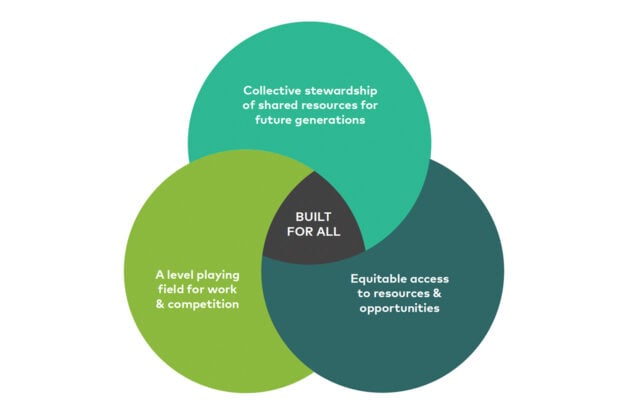Civil services are making progress on gender diversity – but those gains are under threat

The Women Leaders Index shows that most G20 countries are improving gender equality amongst civil service leaders. But speakers at the Index’s formal launch warned of the ever-louder voices of misogynists in politics and wider society – creating pressures that could roll back equality’s hard-won successes. Matt Ross reports
At last week’s official launch of the Women Leaders Index (WLI), which ranks the major economies according to the proportion of women among senior civil servants, the speakers were upbeat about the steady progress visible on gender parity within public sector workforces. But they pointed to a darker political and social background, in which elected leaders and social media platforms fail to challenge the high levels of vitriolic abuse directed against women.
“Social media in the modern age has opened all sorts of hideous behaviours, and some of those involve extraordinary amounts of misogyny,” commented Melanie Dawes, permanent secretary of the UK’s Department for Communities and Local Government and the civil service’s Gender Champion. “I’m quite concerned about our politics; about how much harder it is becoming to be a female MP.”
Siobhan Benita, a former head of civil service governance and communications who chaired the event for Global Government Forum – publishers of the WLI – expressed her fears that the “political context will start to undermine things that you’re doing in the civil service.” Referring to the US president as a “misogynistic man-child”, Benita warned that “all the protections for women that have taken so much effort and time to put in place can be undermined so quickly if you get that type of person in power.”
Similar dynamics can be seen at work in the UK, warned Shaun Scantlebury – head of the diversity and inclusion consultancy practice at professional services firm EY, which sponsored the WLI. “Brexit has, in some people’s minds, given license to the release of some unsavoury behaviours,” he said.
Within the UK civil service “our gender can be confident; we can be optimistic; we’ve got a lot of protections; we’ve made good progress,” added Dawes. “There is a sense of how far we’ve come – but we can lose out so quickly.”
A picture of progress
Summarising the key findings of the WLI, Benita pointed out that over the year, the G20 nations have seen an average rise of 1.5 percentage points in the proportion of female civil servants – with the average score rising by 6.9 points to 26.4% since 2013.
These average figures, though, conceal huge variations in performance since 2016. The top six countries – led by Canada, Australia and South Africa respectively – have continued to make slow but steady progress. The middle seven show patchy movement, with dramatic improvements from Mexico and France whilst Italy slips backwards. And the bottom six are characterised by very slow progress from very low baselines, with both Turkey and South Korea in a worse position today than in 2013.
“The Index this year contains a new element: case studies based on 11 interviews with senior officials and management analysts from different countries,” Benita added. These case studies, she explained, found that fast-improving countries had focused on “five areas: flexible working; workplace culture; talent development; equality legislation; and political will and quotas.”

Siobhan Benita (left), who chaired the event, expressed her fears that the political context will start to undermine things that you’re doing in the civil service (Image courtesy: Matt Ross).
A vigorous agenda
In the UK, commented Dawes, “the diversity and inclusion agenda is way more vigorous than it’s ever been.” The work carried out by former cabinet secretary Lord O’Donnell and Benita between 2005 and 2011, she added, “set the standard,” following which – surviving a period under the 2010-15 coalition government “when it wasn’t something the ministers were terribly keen on” – the agenda has become well embedded into the civil service’s operations and policies.
The results, she said, are clear at the weekly permanent secretaries’ meetings. “I still count the number of women every week,” she commented. “For a long time it was one in five with absolute regularity. Then about six to nine months ago, it became 25-30% most weeks. It’s amazing the difference that makes – and there’s research to show that 30% is the magic number, when you stop feeling like you’re in a minority.”
Indeed, the leadership team of Dawes’s own department is now dominated by women – leaving her with a novel problem. “Female leaders attract female leaders,” she said. “We’re now thinking about whether to bring some of our male directors onto the team so that we can adjust the gender balance.”

Shaun Scantlebury, head of the diversity and inclusion consultancy practice at EY, warned “Brexit has, in some people’s minds, given license to the release of some unsavoury behaviours” (Image courtesy: Matt Ross).
How do you get there?
The UK lies fourth in the G20 rankings, and if it maintains its 1.3 point growth rate it may well overtake South Africa this year. Its civil service leaders, Dawes explained, have made progress by pushing on three fronts.
First, she said, officials have “scrubbed down our processes” – covering “everything from recruitment to Fast Stream programmes, training, promotion boards, talent management, maternity leave and support when you return to work.” By reviewing civil service processes through the lens of their impact on gender equality, organisations have addressed many of the hidden traps holding back women.
Second, organisations have introduced “positive action” schemes such as dedicated advice and support, mentoring, networks, training and career development schemes. These help talented women to overcome some of the social and cultural barriers that can hamper progress – helping women to boost their confidence and expand their contacts, for example.
Third, Dawes focused on “culture and behaviours” – particularly unconscious bias training. “Till the day I die, I’ll continue to work on my unconscious biases,” she said. “We’ve all grown up a particular world with particular influences; there’s nothing we can do about that. But we can try to expand our spheres of influence and understand what drives us.”
As Benita pointed out, the WLI’s two fastest-progressing countries – France and Mexico – have recently introduced quotas as part of their drive for gender parity. But Dawes made clear that she’s not a fan of targets: “I’m not that convinced that they work very well in the civil service context,” she said. “They can lead to the wrong behaviours”.
A wider view
Turning to the bigger picture, Scantlebury raised the issue of “job and work design.” Making senior jobs part-time or flexible can reduce their influence in the system – so “rather than trying to adapt roles to work flexibly, can we start again? Can we think about the outcome that we’re looking for, and work backwards to design the job?”
Scantlebury also highlighted the importance of “inclusive leadership” and of clear messages from the top of an organisation. “This needs to be sponsored from the top, or it will fall off the agenda – and it’s frightening how quickly things can fall away,” he said.
It can be easier to get consistent positive messages from civil service leaders, Dawes argued, when a country’s top officials are selected according to merit rather than appointed by politicians. The UK’s is a “regulated system based on fair and open competition. That means that while ministers will sometimes have a view, if they don’t like a candidate then all that happens is that you start the process again: they can’t pick someone else out of the field.” So leaders aren’t “subject to the variance of political choices coming in and making it harder to achieve diversity.”
However, Dawes acknowledged that the UK suffers from stratified civil service structures that can make life hard for more junior officials. One audience member – a former councillor and Parliamentary employee – said of her time in the civil service: “It isn’t the first time I’ve experienced hassle being a woman, but it’s the first time I’ve felt unable to effectively challenge it at my level.”
Complaints about bullying and harassment are, replied Dawes, “very much higher at lower grades. There’s something about the hierarchical nature of the civil service which is a problem for us on inclusion.”

“It’s much easier to be inclusive when there’s a growing economy and less uncertainty,” observations from the audience (Image courtesy: Matt Ross).
Back to the background
Despite such issues, most G20 civil services continue to make steady progress towards gender equality. Yet both panellists and audience members were plainly concerned that wider economic, social and cultural pressures could derail the agenda within government.
“It’s much easier to be inclusive when there’s a growing economy and less uncertainty,” commented one member of the audience. And Melanie Dawes warned that the growth of identity politics makes inclusivity in the civil service still more important, ensuring that each community feels that its views are being heard and its needs recognised.
“Increasingly, identity is becoming something that dominates in this uncertain world – whether it’s in Northern Ireland, or for people in Muslim countries, or for women. There’s a risk that we fracture,” she said. And such fractures can be very dangerous: “The risk is that identity politics becomes so nasty that voices get crushed, and appalling and horrible things do happen – from bad behaviour through to people being killed.”
“The only answer is to focus on this and knuckle down. If we pull back, then we’re even less equipped to hear people’s voices and understand what they’re telling us about what they need in the workplace or in their communities,” she concluded. “That, for me, is why this is an existential agenda if we’re to do our jobs properly.”
Our news report on the September launch of the WLI report, including links to the online data tool and the report itself, can be found here
About Matt Ross
Matt is Global Government Forum's Contributing Editor, providing direction and support on topics, products and audience interests across GGF’s editorial, events and research operations. He has been a journalist and editor since 1995, beginning in motoring and travel journalism – and combining the two in a 30-month, 30-country 4x4 expedition funded by magazine photo-journalism. Between 2002 and 2008 he was Features Editor of Haymarket news magazine Regeneration & Renewal, covering urban regeneration, economic growth and community development; and from 2008 to 2014 he was the Editor of UK magazine and website Civil Service World, then Editorial Director for Public Sector – both at political publishing house Dods. He has also worked as Director of Communications at think tank the Institute for Government.



Related Posts
Latest News
-
How governments are using mobile IDs to transform services for citizens
As governments around the world look to deliver digitally-enabled services,...
- Posted July 14, 2023
- 1
-
Public sector fintech moves up a gear as Dublin hosts fourth Global Government Fintech Lab
Financial technology’s ‘transformative potential’ for public sector transformation has been...
- Posted June 12, 2025
- 0
-
Canada to hit defence spending target ‘half a decade ahead of schedule’, PM says
Canada has set out plans to increase defence spending quicker...
- Posted June 12, 2025
- 0
-
From period pain to heart disease, the gender health gap is real – here’s how to close it
For decades, women’s health has been chronically underfunded and under-researched....
- Posted June 12, 2025
- 0
-
UK Spending Review sets out how government will make reform of the state happen
The UK government has set out how it will fund...
- Posted June 11, 2025
- 0
-
UK Spending Review 2025: live updates
Chancellor Rachel Reeves is setting out details of the UK...
- Posted June 11, 2025
- 0
-
Government structures ill-equipped to deliver climate-resilient infrastructure, report finds
Weak adaptation plans, undefined roles and responsibilities, and a lack...
- Posted June 10, 2025
- 0
-
Brazilian pilot explores letting citizens control – and sell – their personal data
A pilot project in Brazil will explore enabling citizens to...
- Posted June 10, 2025
- 0
Partner content



Related events

















